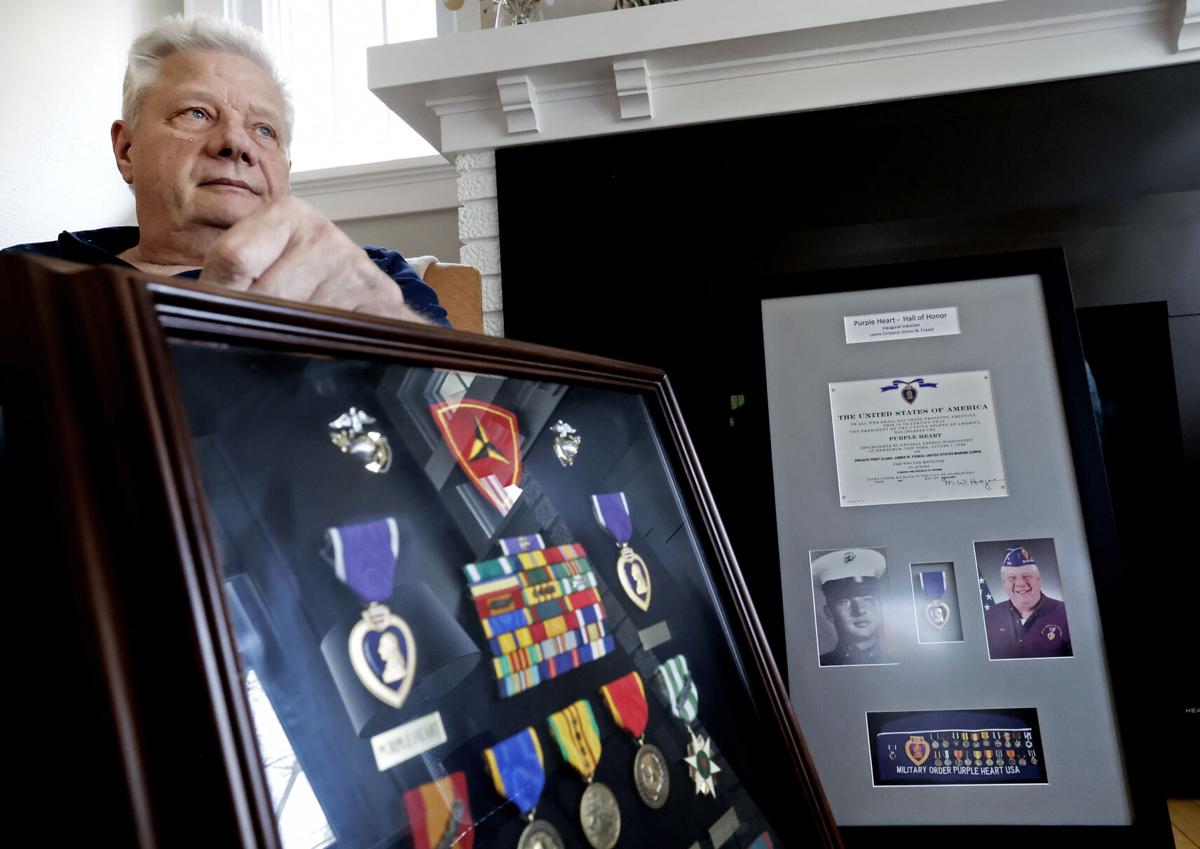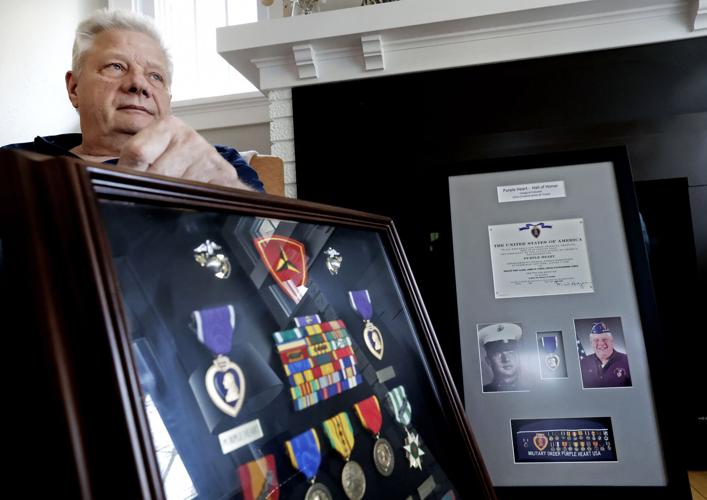During his five months in Vietnam with the Marine Corps, Jim Foseid figures he nearly died a dozen times from gunfire, grenades or disease.
Foseid endured other trauma, including being bitten by a poisonous centipede, getting soaked with Agent Orange and hearing the screams of captured U.S. soldiers being tortured.
In August, Foseid, 75, of Madison, became the first veteran inducted into the Madison Veterans Hospital’s new Purple Heart Hall of Honor. He was shot in the chest while rescuing a South Vietnamese soldier and shot in the helmet before a grenade exploded near him, sending shrapnel into his head.
The Purple Heart hall “is another way for us to honor local veterans that were wounded or killed in action,” said Joe Naylor, the hospital’s head of community relations.
People are also reading…

Jim Foseid keeps a grenade pin he used and bullets from a magazine that were damaged by the impact of a bullet that hit him in the chest.
The hospital’s Hall of Heroes, which started in 2002 and requires valorous awards at the level of bronze stars or above, added Terry Christensen as its 20th inductee early this month, shortly before he died. Christensen, 74, of Endeavor, also served in Vietnam with the Marines, running into a burning helicopter three times, even after being burned.
Foseid is a 1967 graduate of West High School, where he was a champion swimmer. He was asked to train in California for the 1968 Olympics. Instead, he enlisted in the Marines and fought in the Vietnam War in 1968, joining his father and three brothers in military service.
“I came from a very patriotic family,” he said. “I think you have a loyalty to your country, first and foremost.”

Jim Foseid looks at letters he sent home while in Vietnam. “This is part of my fox hole," he said, noting dirt on the letters. "You lived in mud the whole time.”
The nightmares he experienced after combat have mostly stopped, but Foseid said he still struggles with post-traumatic stress disorder. At the VA hospital, where his blood is treated and monitored for Agent Orange exposure, he had both thumb joints replaced because they were damaged by machine gun trauma.
Surviving a dozen brushes with death before his 20th birthday has given Foseid a positive outlook, he said. He and his high school sweetheart, Marla Waisman, who have been married for 48 years, have two daughters and five granddaughters.
“You can’t change the bad. All you can do is look for the good in the bad,” he said. “How is it that anybody can be so lucky? I honestly don’t understand.”

Jim Foseid recounts memories of his time in Vietnam and his dozen brushes with death there in a booklet he called “A Lucky, Lucky Man x 12."
In a booklet he compiled a few years ago, titled, “A Lucky, Lucky Man x 12,” Foseid recounts his many close calls. According to the account:
The bullet to his chest, near his heart, hit the bottom corner of a magazine of bullets he was wearing, traveling through the device and into the bottom of his chin. The impact broke his rib, earning him a Purple Heart.
After two bullets later hit his helmet, knocking it off, a grenade landed beside his foxhole and exploded, putting shrapnel into the back of his skull. He received a second Purple Heart, which the hospital plans to add to his plaque once it receives a certificate.
Earlier that same day, a chunk of metal from a rocket launcher whizzed by Foseid’s head. Bullets wounded the man in front of him and passed through Foseid’s jacket and pants, but they didn’t hit his body. As two North Vietnamese soldiers approached his bomb crater, he killed them with a grenade.
Other near misses include being ambushed on patrol and an American helicopter crash killing the man beside him. When a white phosphorous round landed next to Foseid’s foxhole, he happened to be away — getting medical care for the centipede bite.

Jim Foseid displays two Purple Hearts and other medals he and his unit received on a military cap. He is commander of the Military Order of the Purple Heart, Chapter 165, which has more than 100 members.
On the day his unit got sprayed with Agent Orange, friendly fire mistakenly killed 23 nearby U.S. soldiers and wounded 12. The same day, firing by the North Vietnamese killed another 11 soldiers and wounded 37.
A sniper barely missed Foseid one time, and friendly fire hit a tree he was standing behind.
His last near-death experience in the military was the reason he left Vietnam: He got malaria and was flown to Japan for treatment. To break his fever, doctors gave him a drug they said could cause cardiac arrest. It did, leading him to have what he describes as an out-of-body experience before being revived.
After Foseid was discharged in March 1969 and returned home, he went to UW-Madison and had yet another close call. While working at his parents’ farm in Black Earth, a wood pile exploded, burning his arms and hands. He was hospitalized for a month.
Foseid eventually worked as a landlord and in the lending business, including for Badger Mortgage.

A plaque from the Madison Veterans Hospital recognizes Jim Foseid as the first inductee into the hospital's Purple Heart Hall of Honor.
When he first arrived in Vietnam, he said, a fellow Marine told him his battalion was known as the “horizontal unit,” meaning soldiers typically left on stretchers from wounds, illness or death.
“Boy, was he right,” Foseid said. Of the 1,000 soldiers in the battalion, he said 170 were killed, four went missing and 404 were wounded.
“I was very lucky,” he said. “There’s not a day that goes by that I don’t give it some thought.”



















